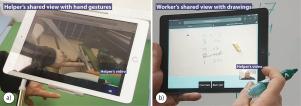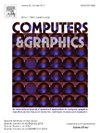Supporting tailorability in augmented reality based remote assistance in the manufacturing industry: A user study
IF 2.5
4区 计算机科学
Q2 COMPUTER SCIENCE, SOFTWARE ENGINEERING
引用次数: 0
Abstract
Research on remote assistance in real-world industries is sparse, as most research is conducted in the laboratory under controlled conditions. Consequently, little is known about how users tailor remote assistance technologies at work. Therefore, we developed an augmented reality-based remote assistance prototype called Remote Assist Kit (RAK). RAK is a component-based system, allowing us to study tailoring activities and the usefulness of tailorable remote assistance technologies. We conducted a user evaluation with employees from the plastic manufacturing industry. The employees configured the RAK to solve real-world problems in three collaborative scenarios: (1) troubleshooting a running injection molding machine, (2) tool maintenance, (3) solving a trigonometry problem. Our results show that the tailorability of RAK was perceived as useful, and users were able to successfully tailor RAK to the distinct properties of the scenarios. Specific findings and their implications for the design of tailorable remote assistance technologies are presented. Among other findings, requirements specific to remote assistance in the manufacturing industry were discussed, such as the importance of sharing machine sounds between the local operator and the remote helper.

在基于增强现实技术的制造业远程协助中支持量身定制:用户研究
由于大多数研究都是在受控条件下在实验室中进行的,因此对实际行业中远程协助的研究很少。因此,人们对用户在工作中如何使用远程协助技术知之甚少。因此,我们开发了一个基于增强现实技术的远程协助原型,名为远程协助工具包(RAK)。RAK 是一个基于组件的系统,使我们能够研究定制活动和可定制远程协助技术的实用性。我们对塑料制造业的员工进行了用户评估。员工们对 RAK 进行了配置,以解决三个协作场景中的实际问题:(1) 对运行中的注塑机进行故障排除,(2) 工具维护,(3) 解决三角函数问题。我们的结果表明,RAK 的可定制性被认为是有用的,用户能够成功地定制 RAK 以适应不同场景的不同特性。本文介绍了具体的研究结果及其对量身定制的远程协助技术设计的影响。除其他发现外,还讨论了制造业对远程协助的具体要求,例如本地操作员和远程协助人员共享机器声音的重要性。
本文章由计算机程序翻译,如有差异,请以英文原文为准。
求助全文
约1分钟内获得全文
求助全文
来源期刊

Computers & Graphics-Uk
工程技术-计算机:软件工程
CiteScore
5.30
自引率
12.00%
发文量
173
审稿时长
38 days
期刊介绍:
Computers & Graphics is dedicated to disseminate information on research and applications of computer graphics (CG) techniques. The journal encourages articles on:
1. Research and applications of interactive computer graphics. We are particularly interested in novel interaction techniques and applications of CG to problem domains.
2. State-of-the-art papers on late-breaking, cutting-edge research on CG.
3. Information on innovative uses of graphics principles and technologies.
4. Tutorial papers on both teaching CG principles and innovative uses of CG in education.
 求助内容:
求助内容: 应助结果提醒方式:
应助结果提醒方式:


